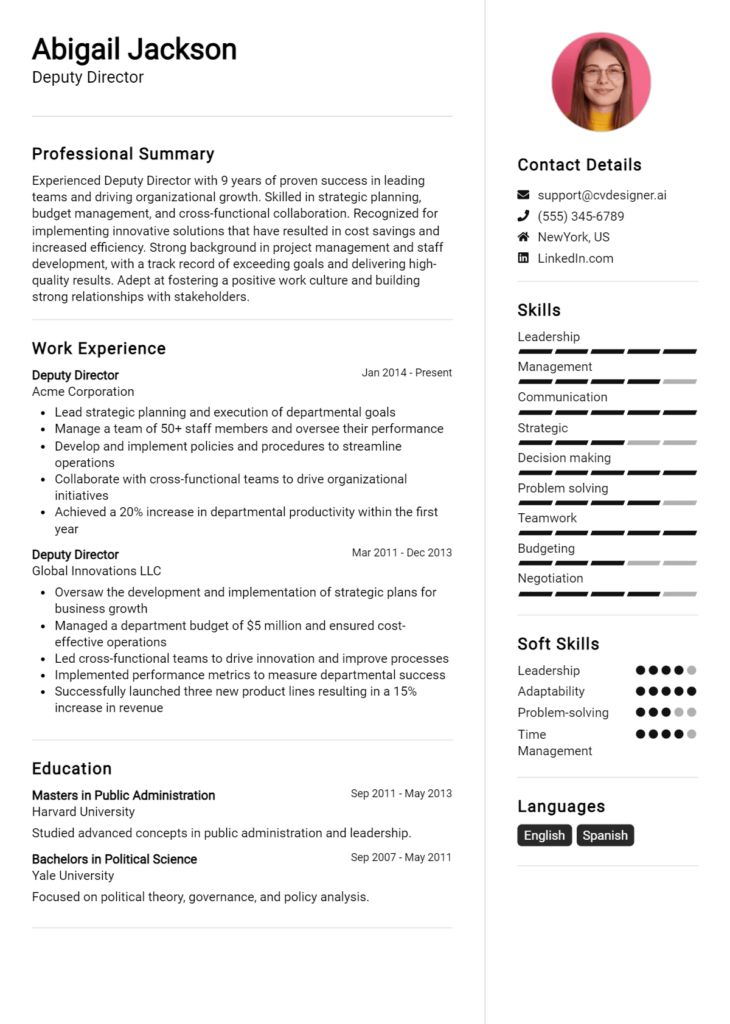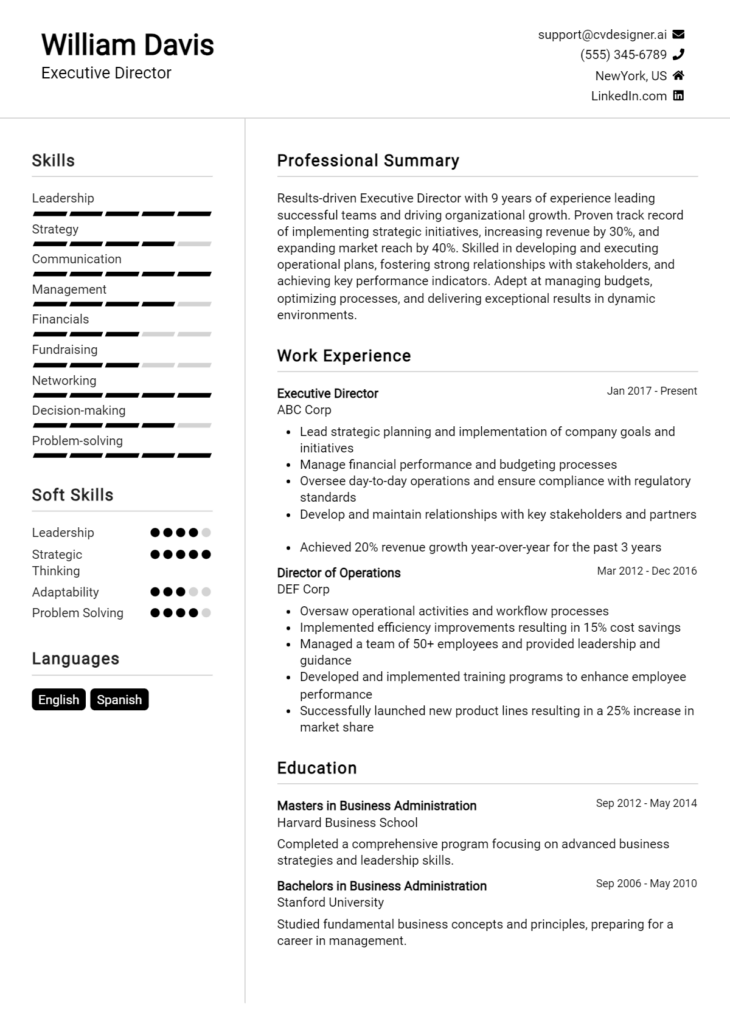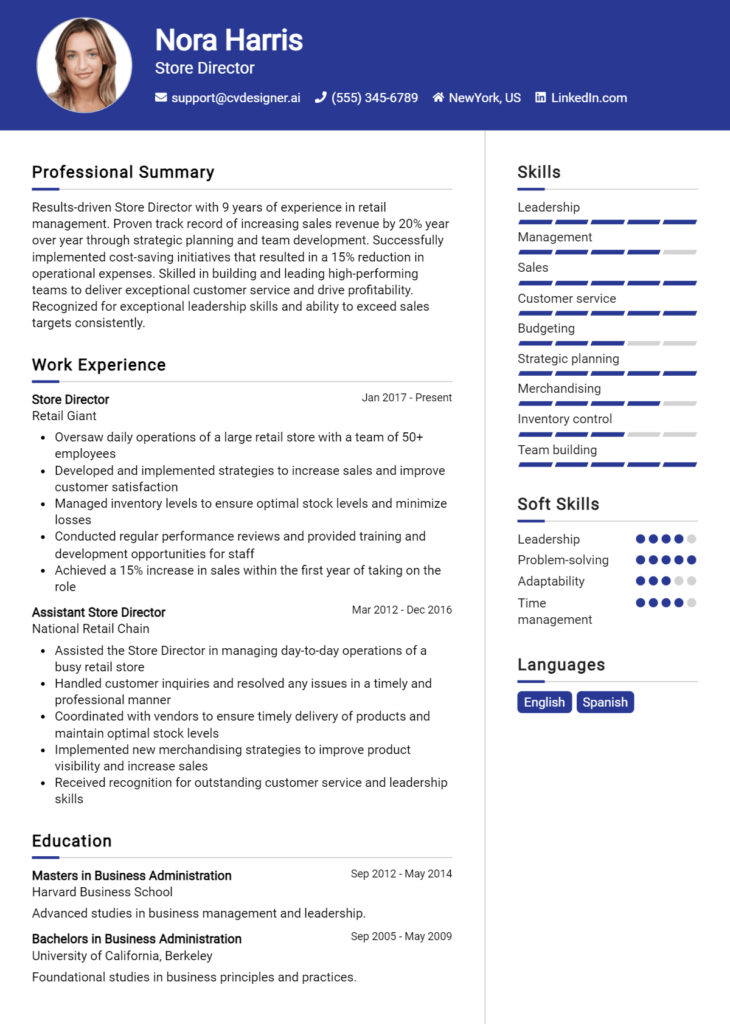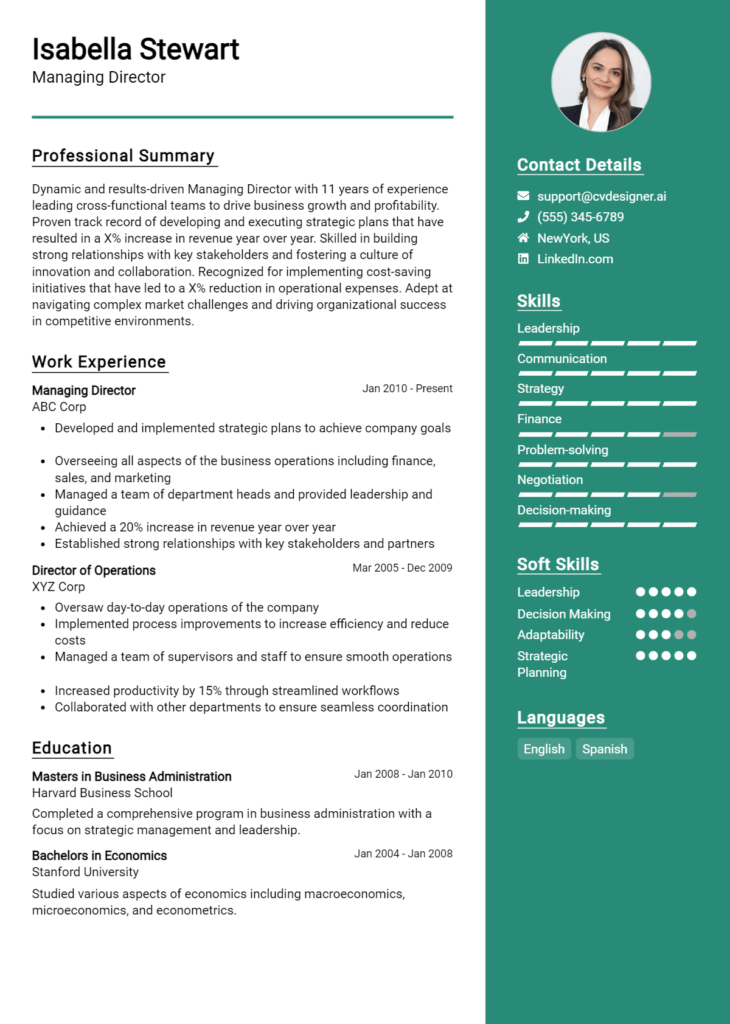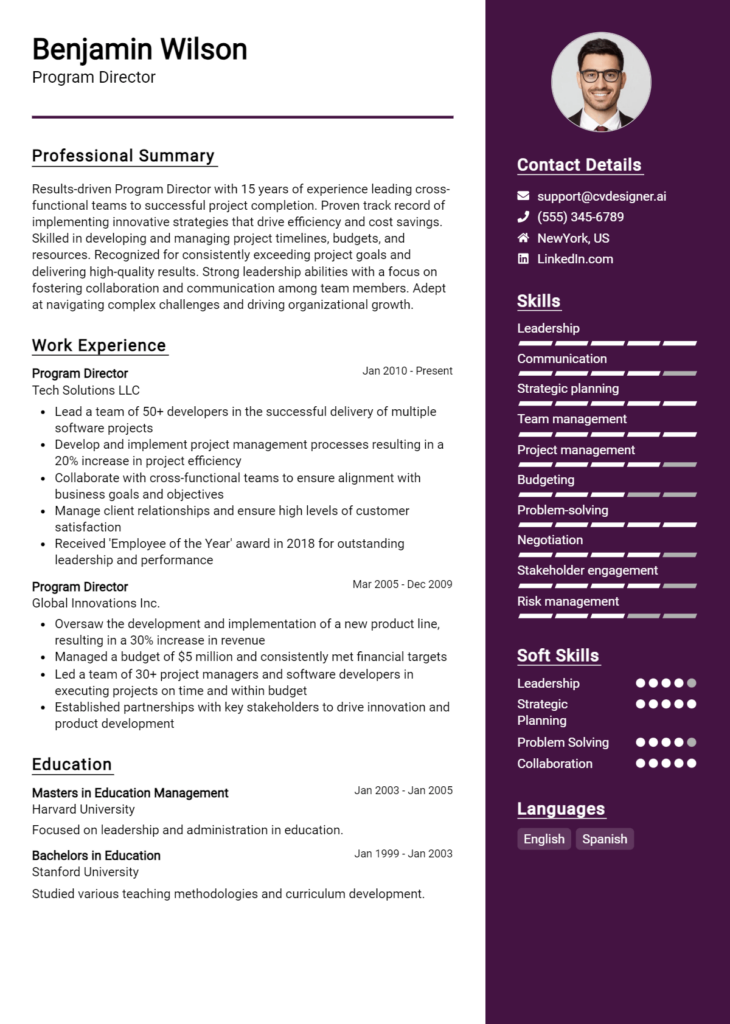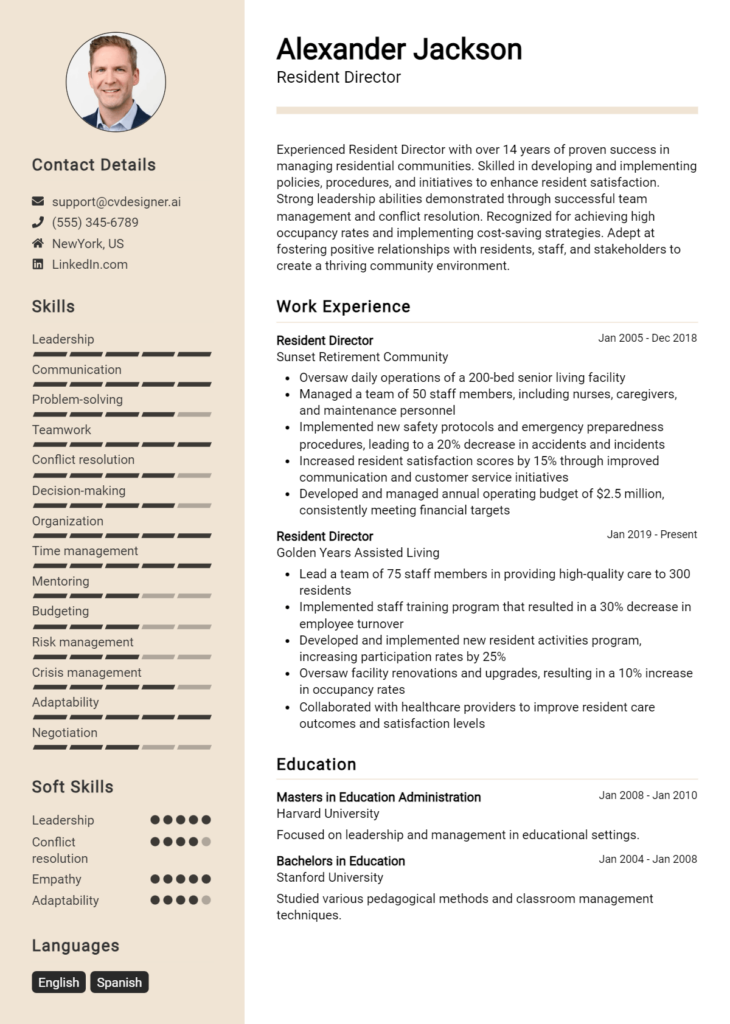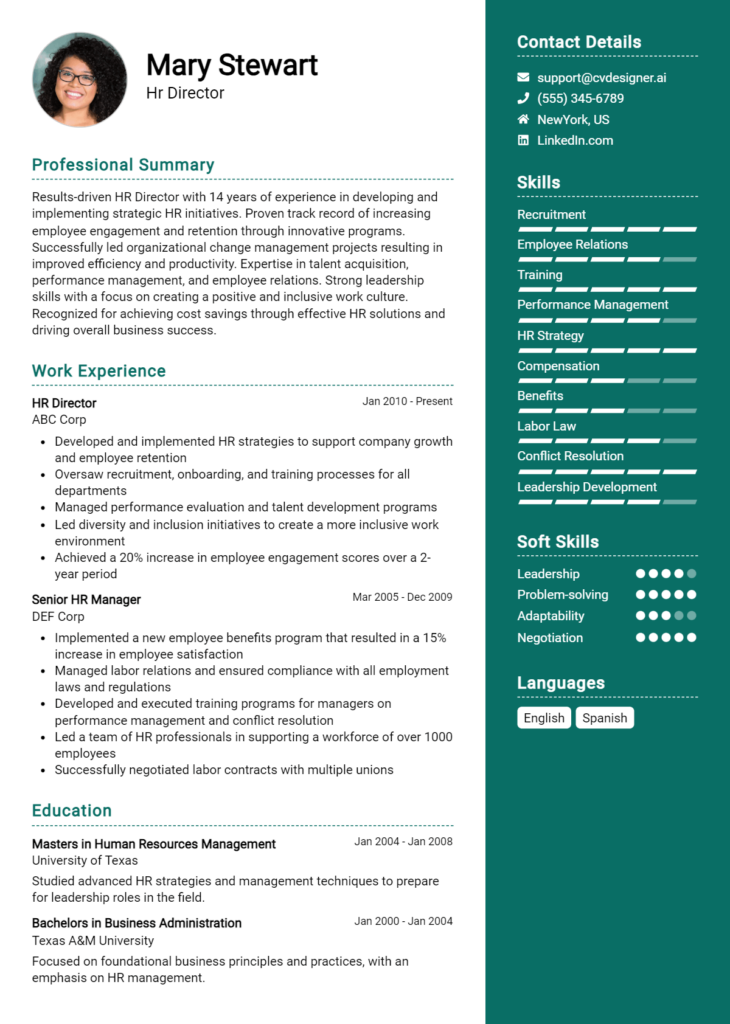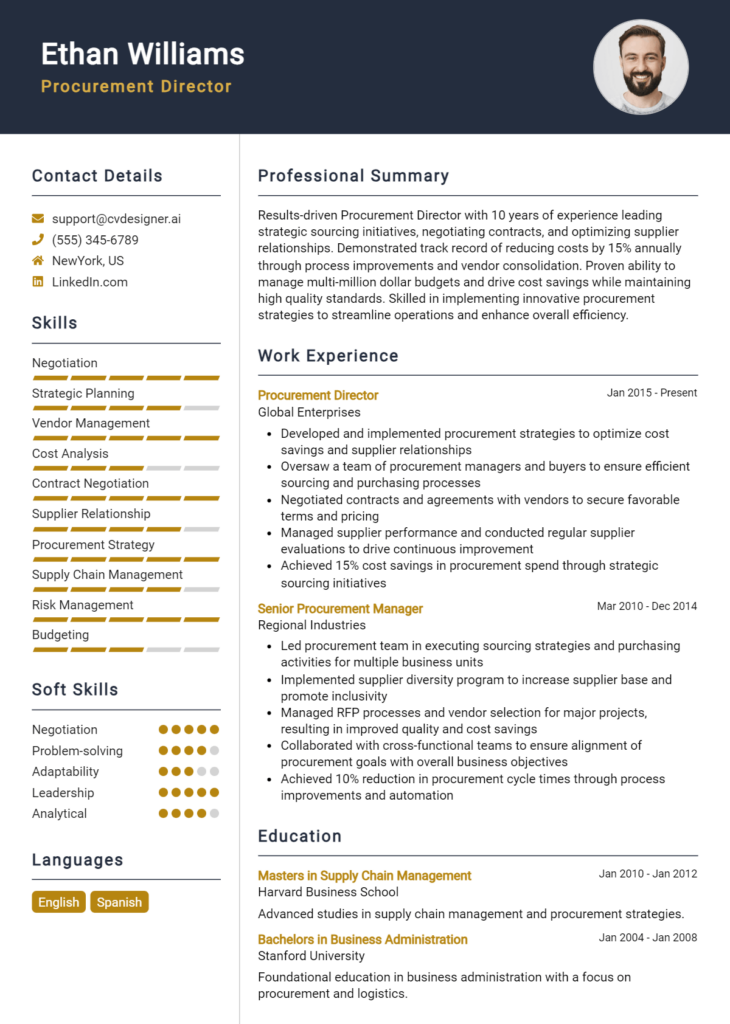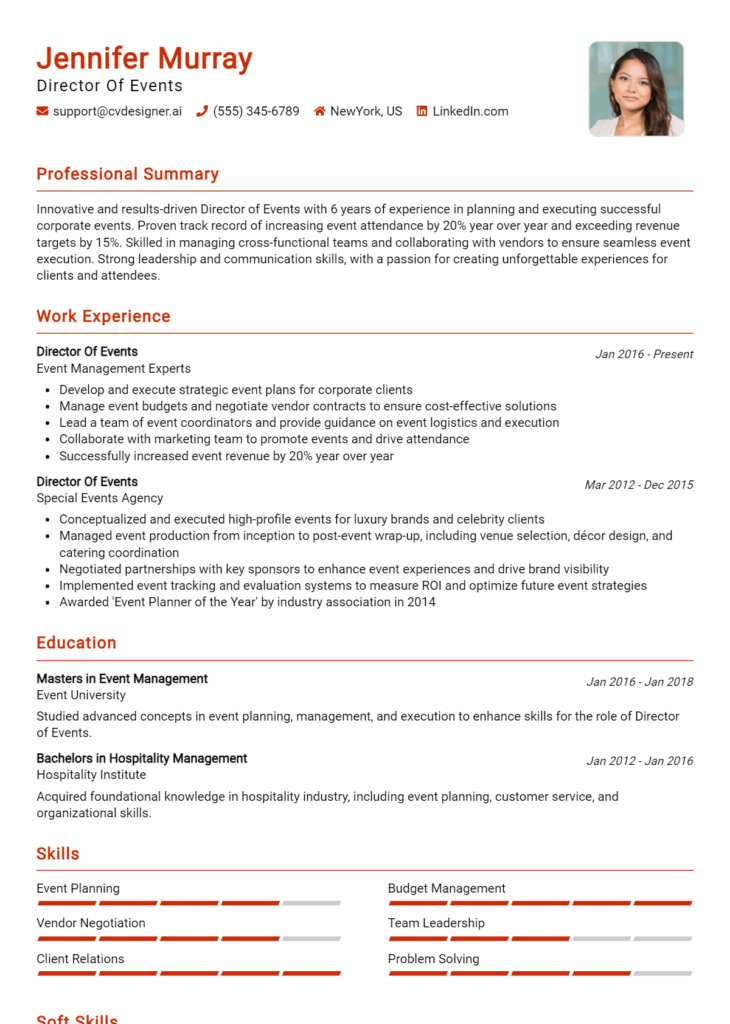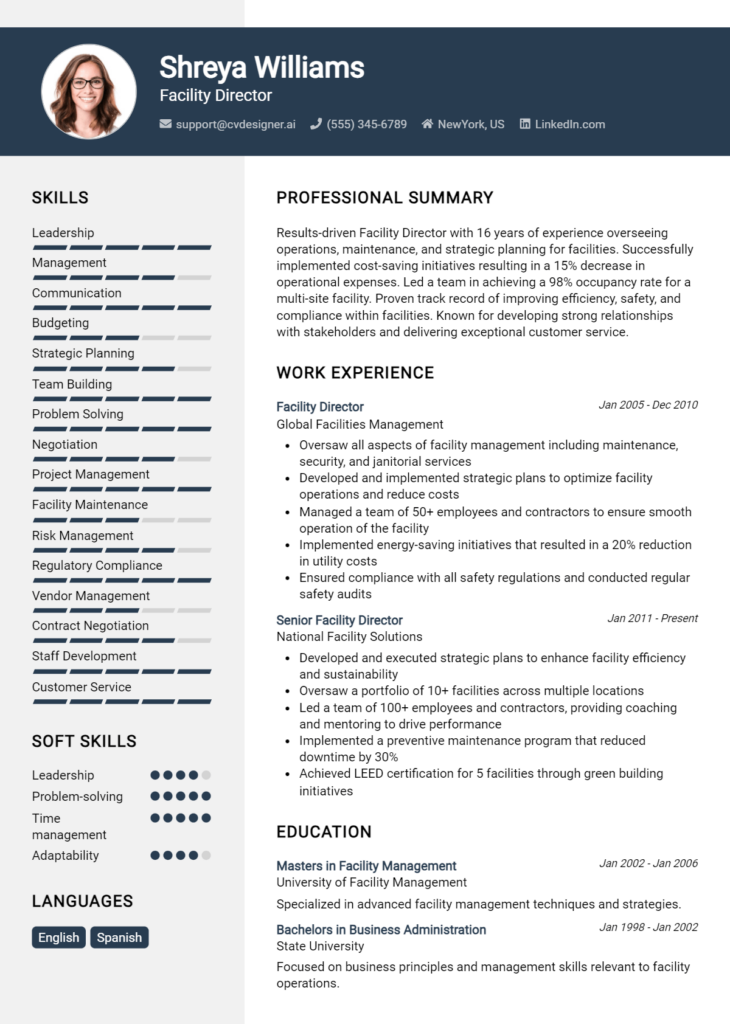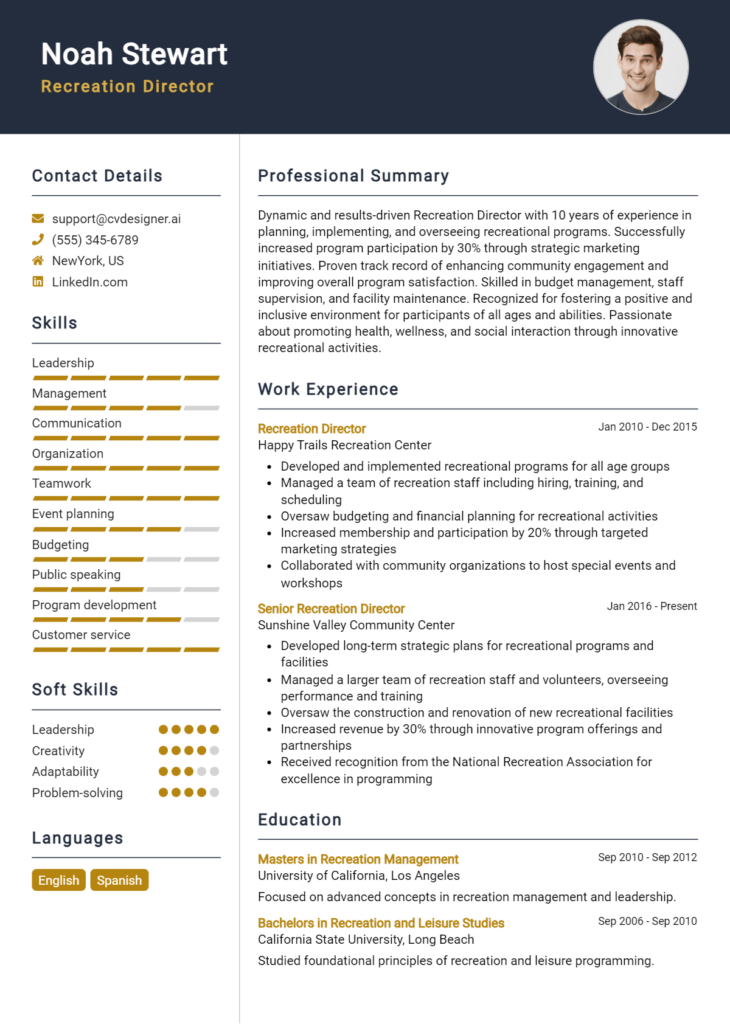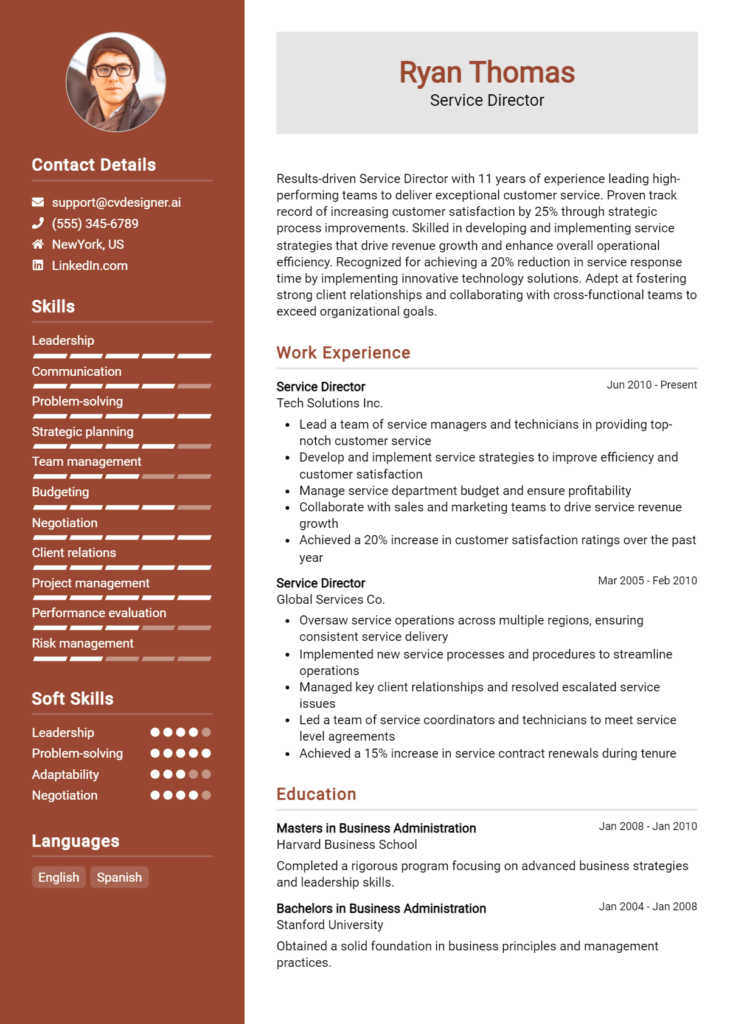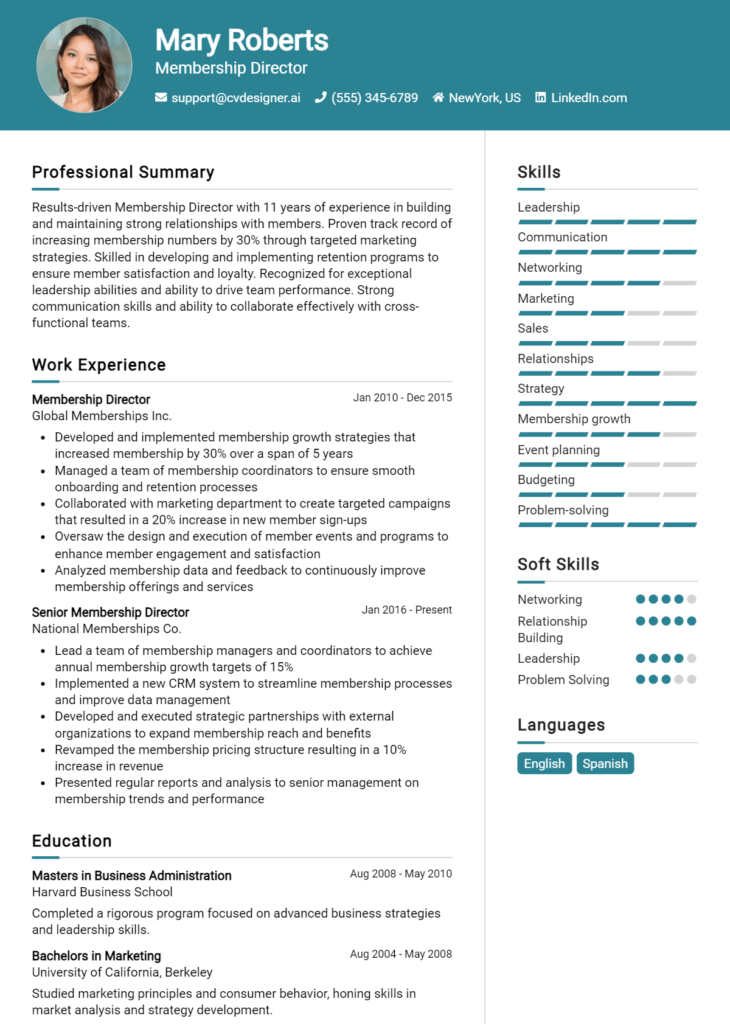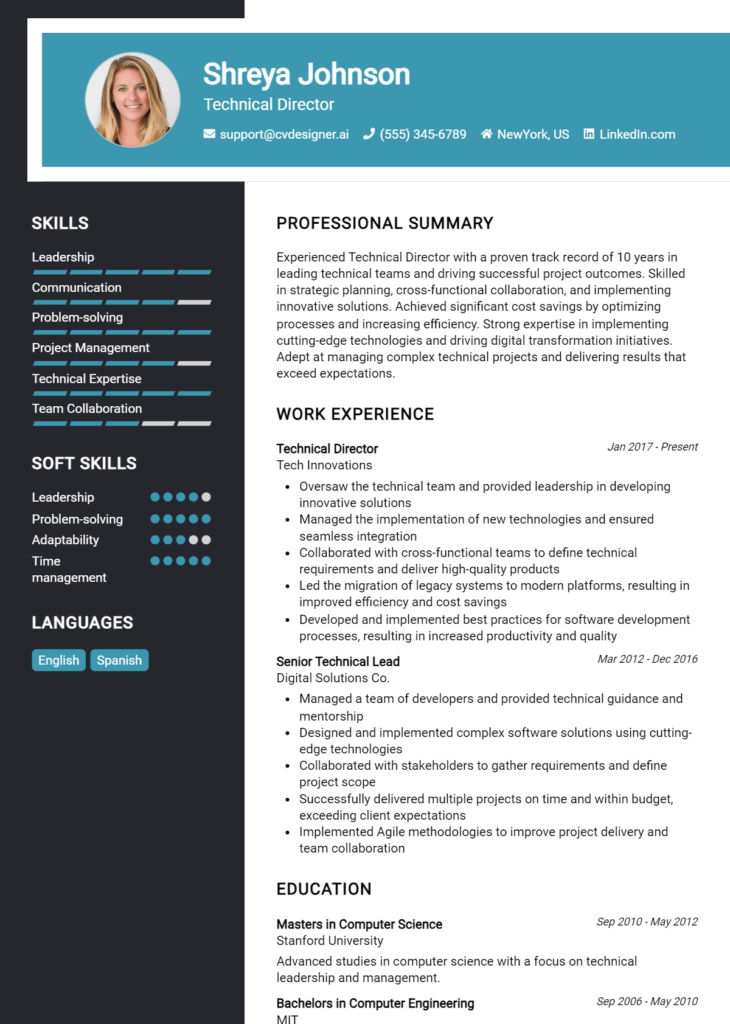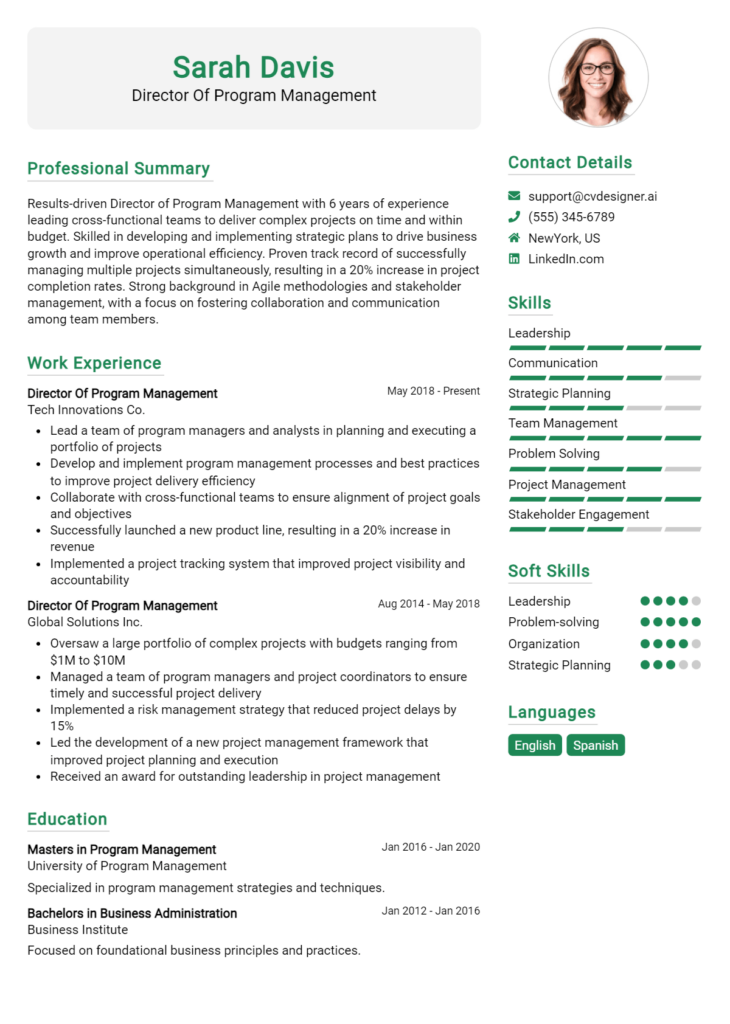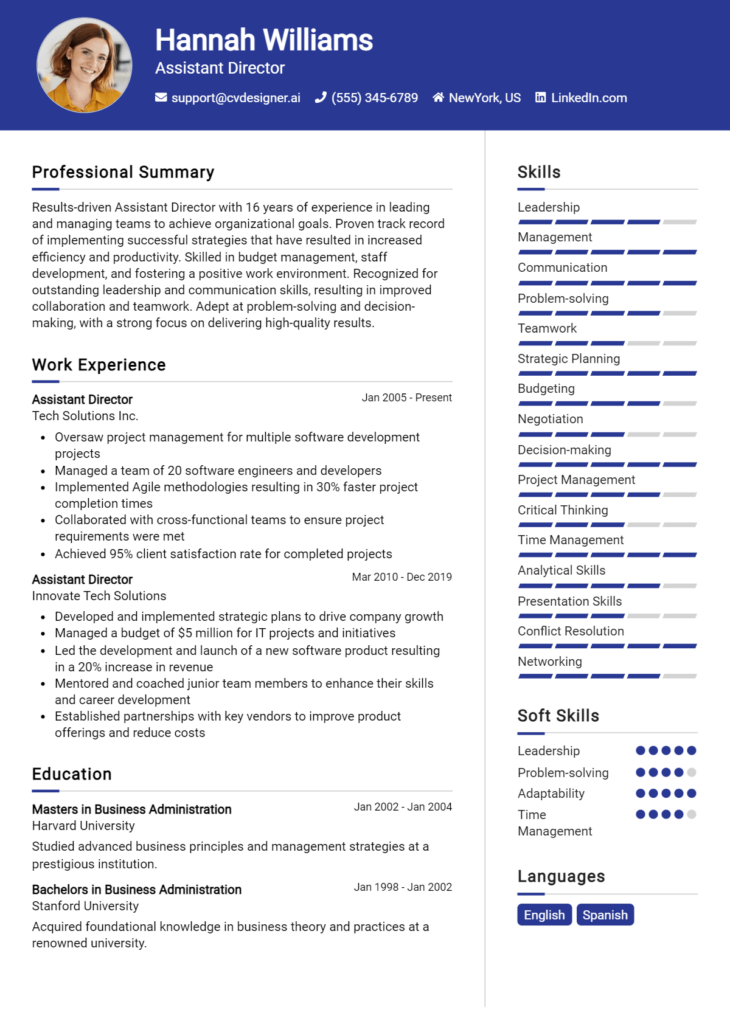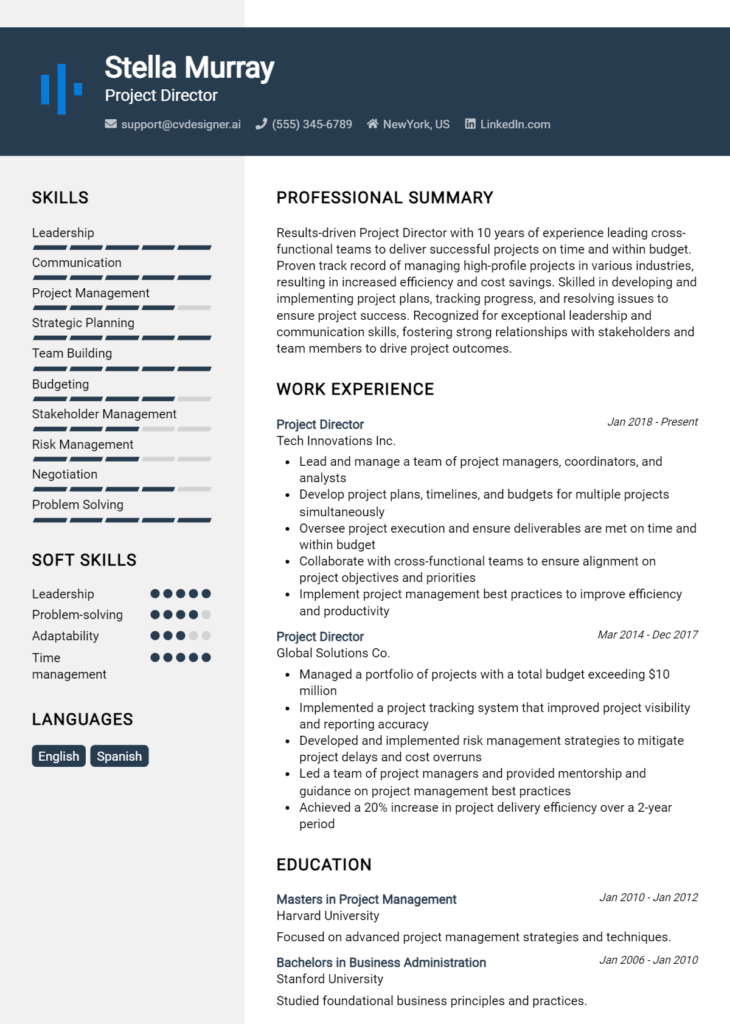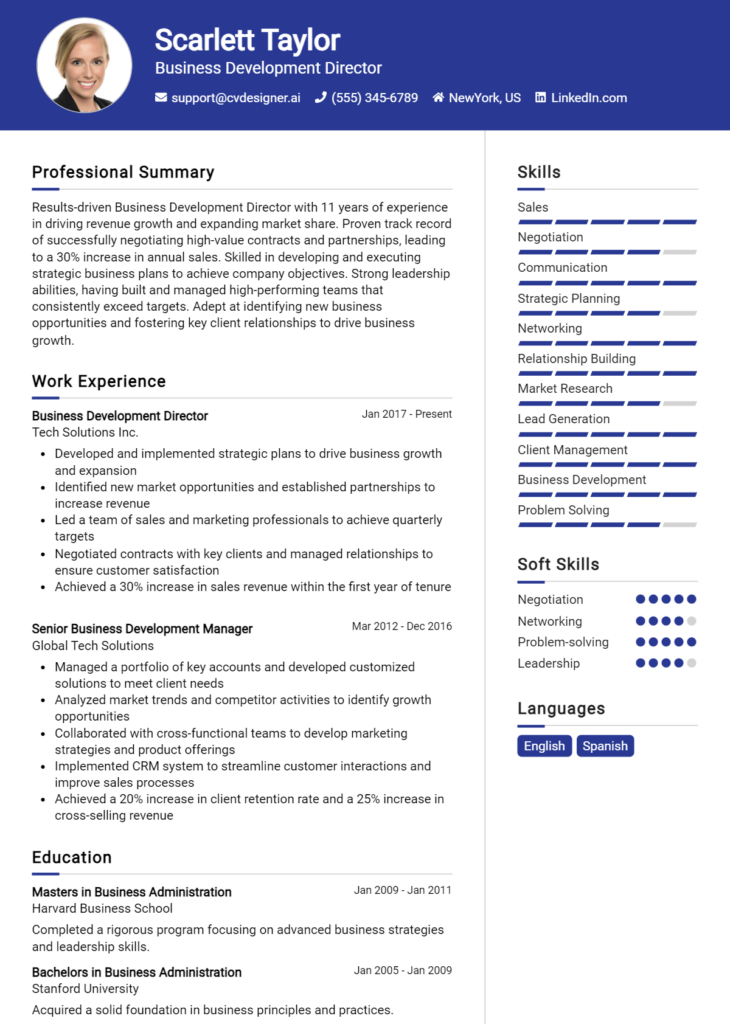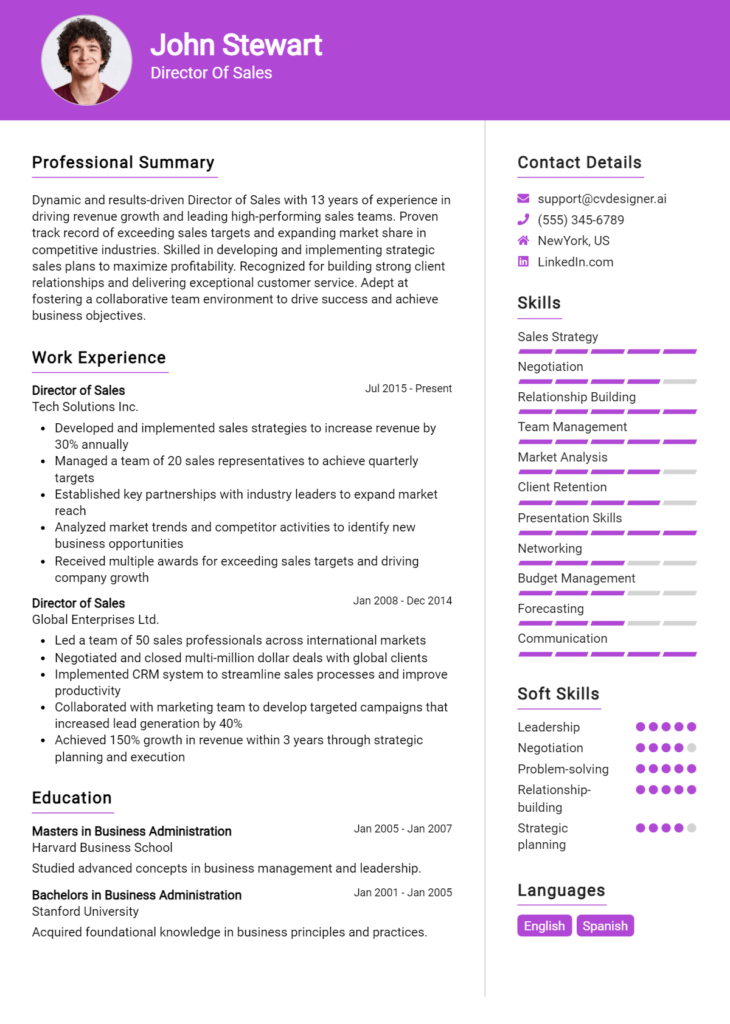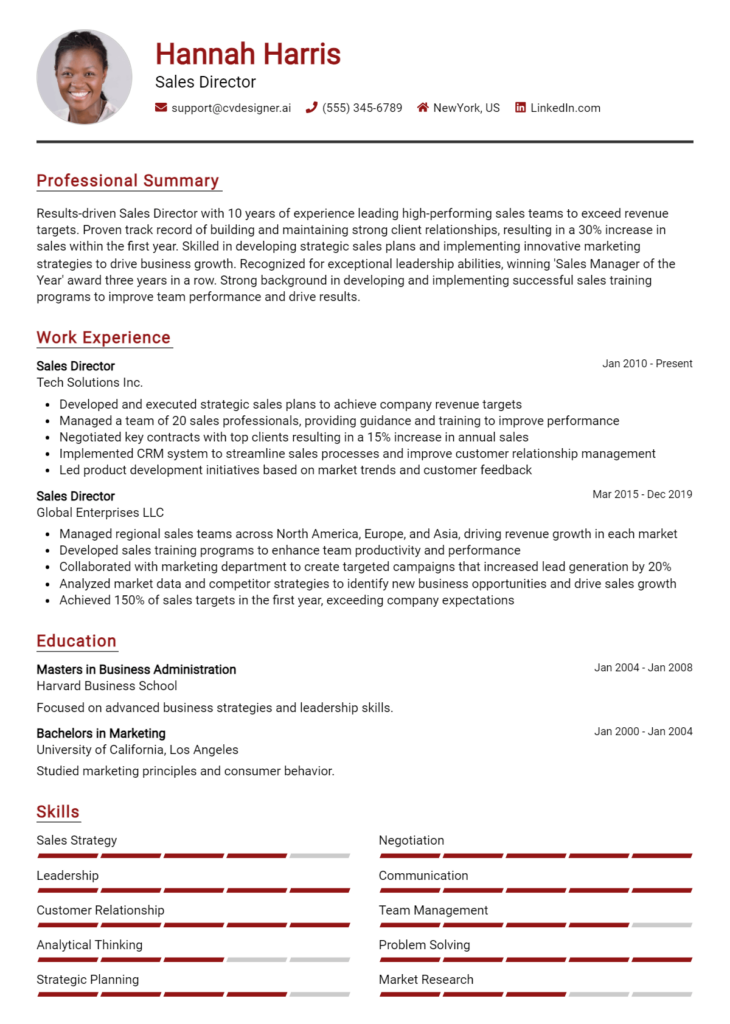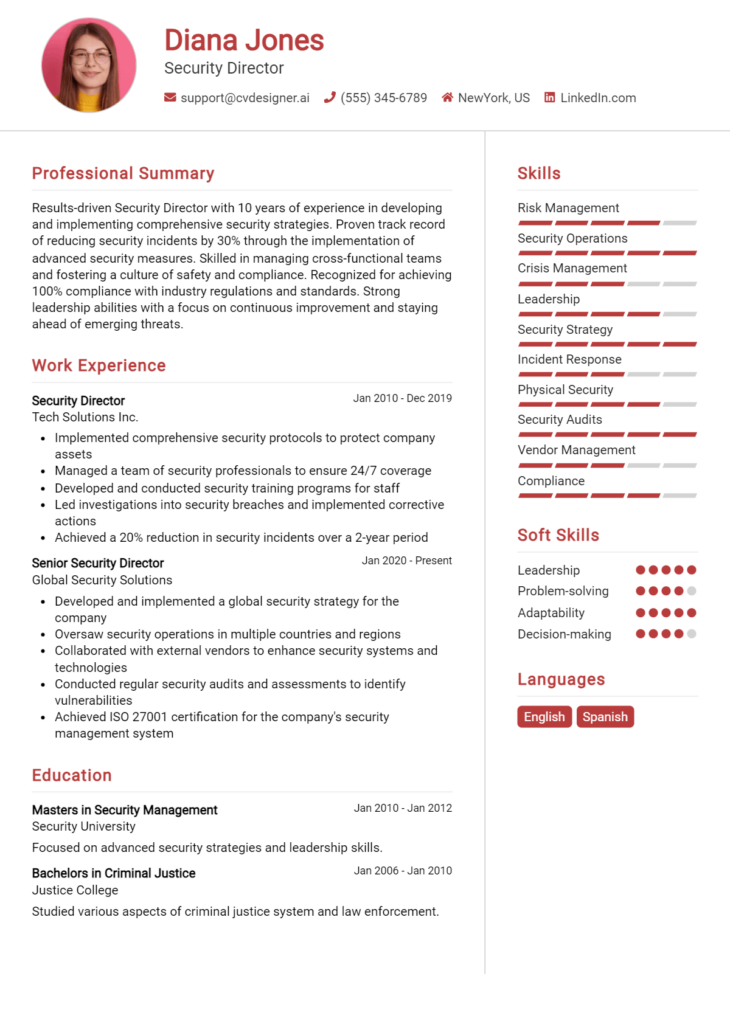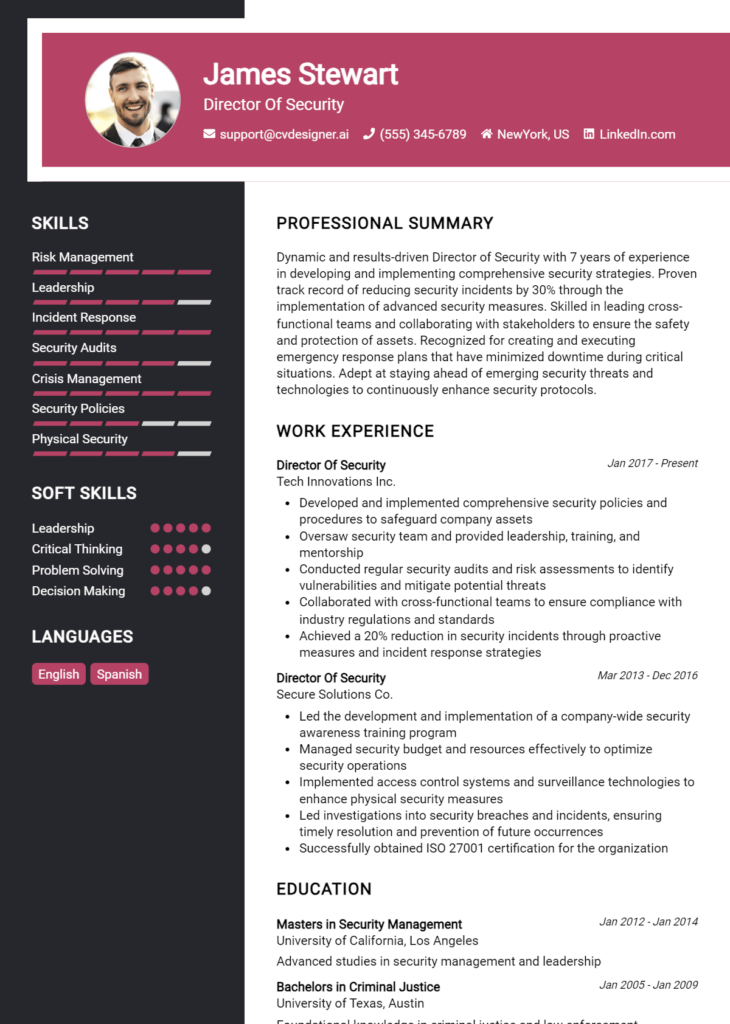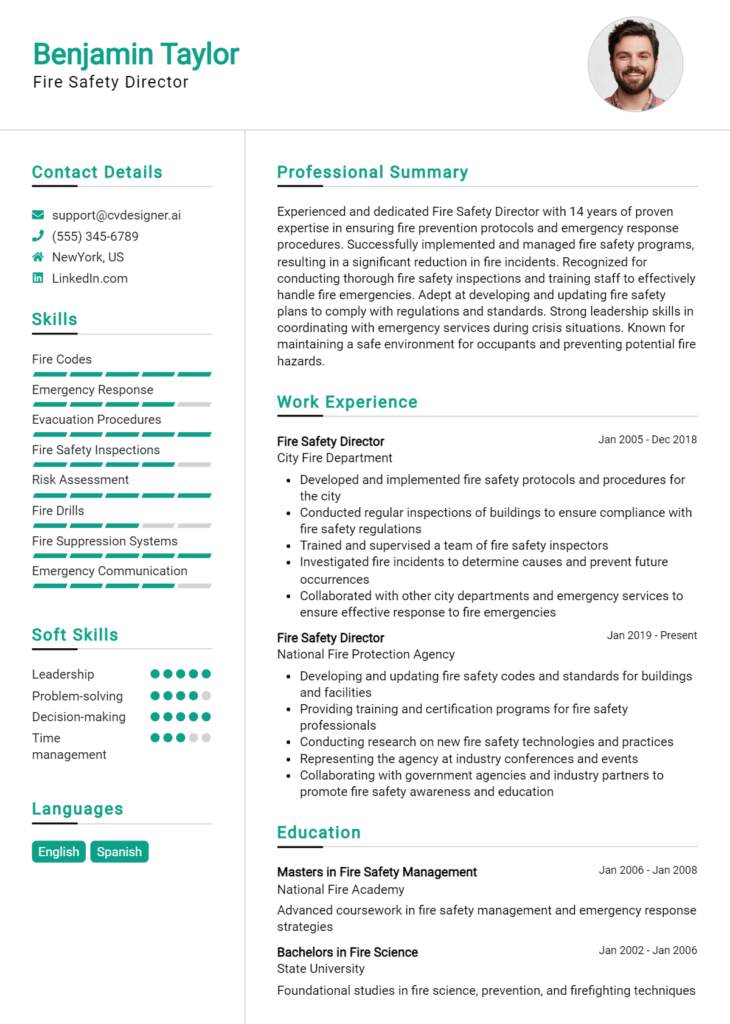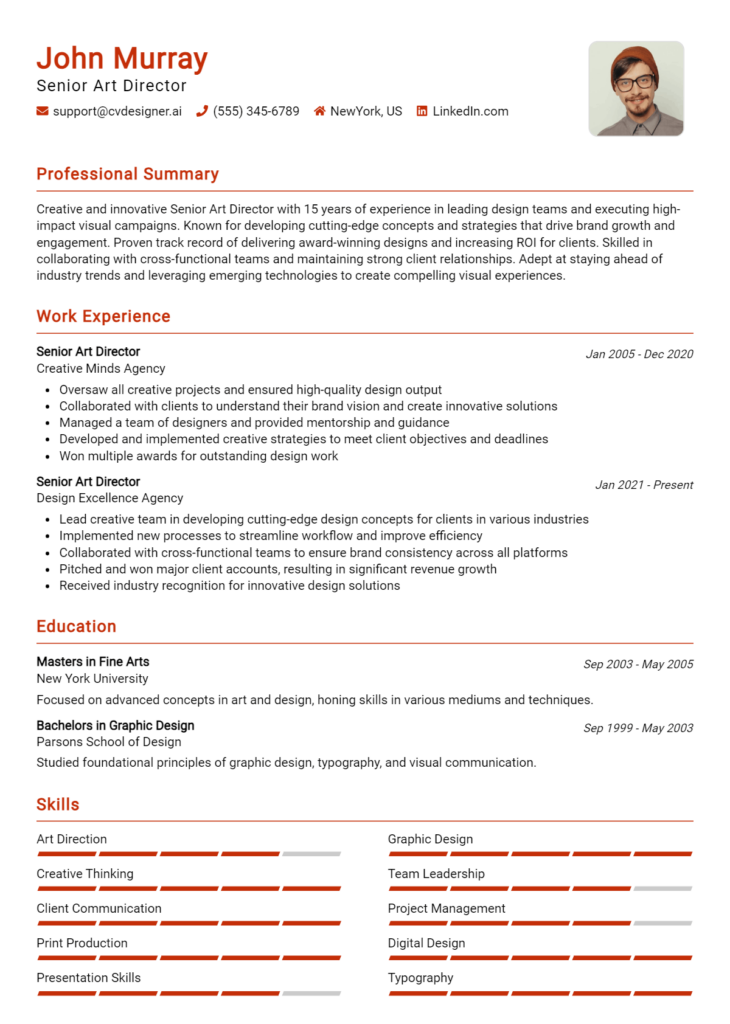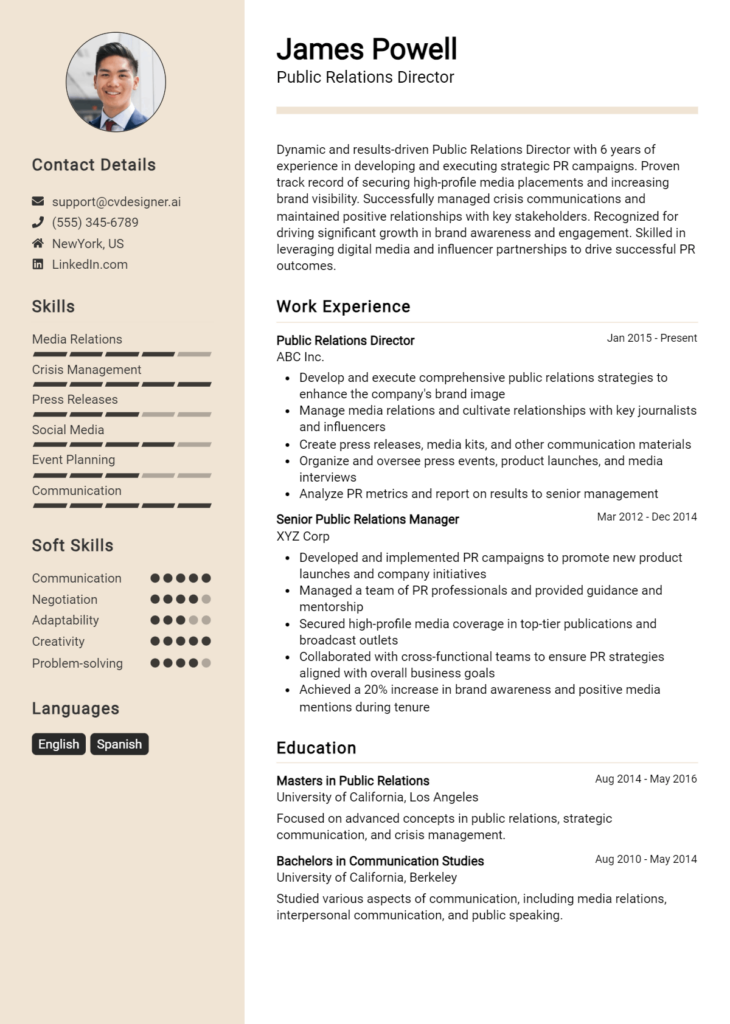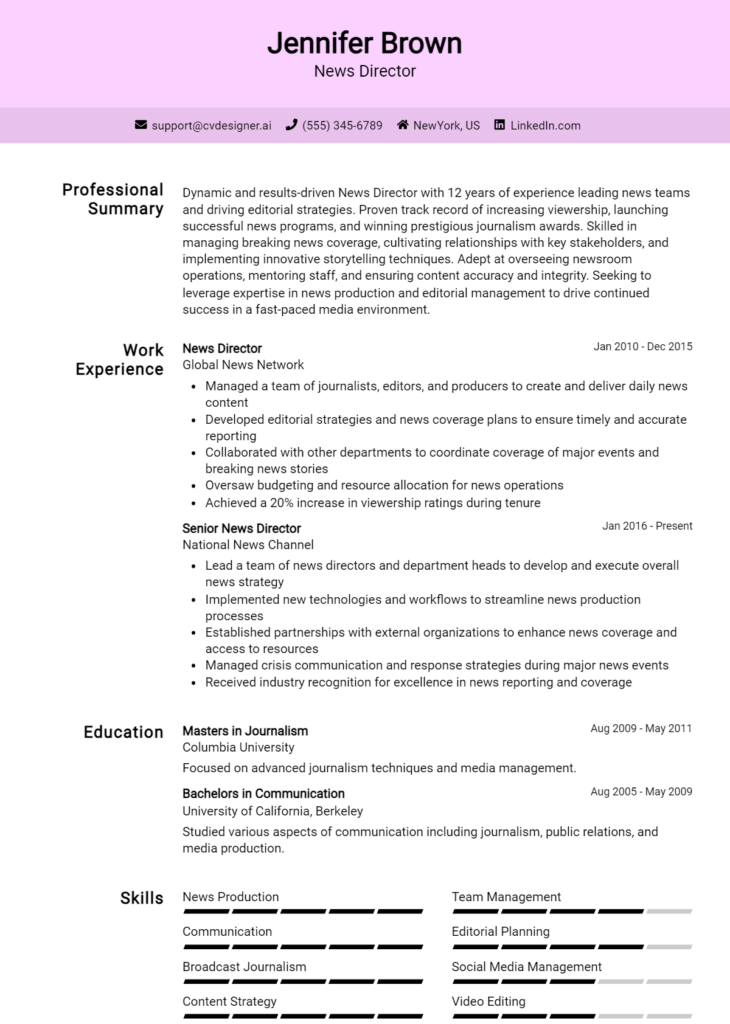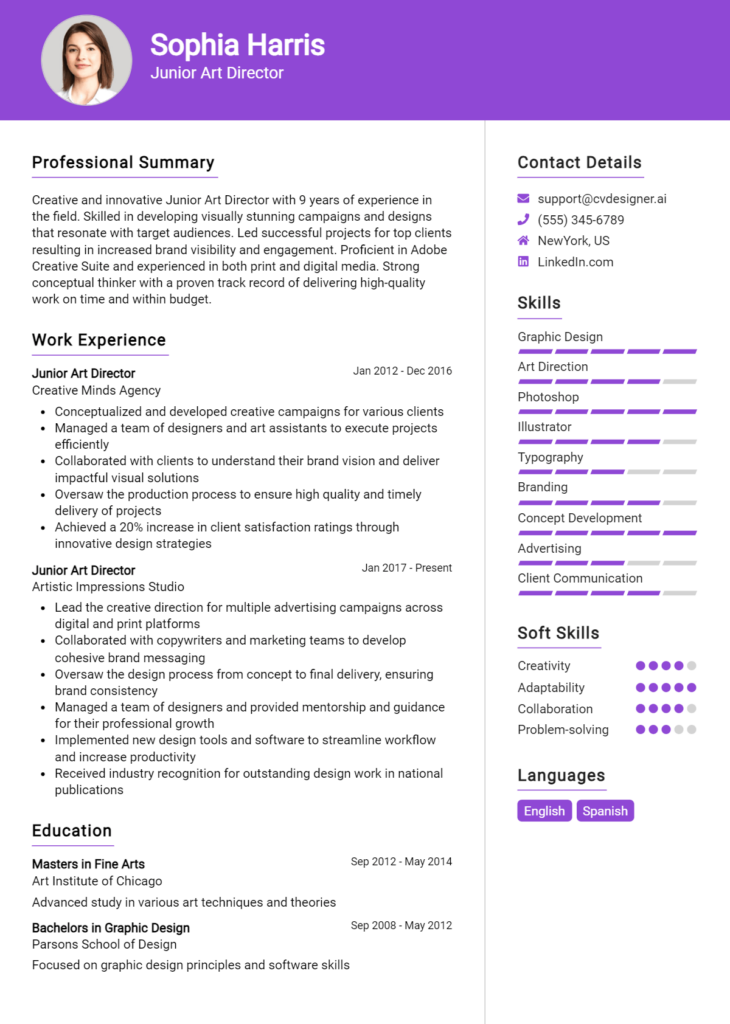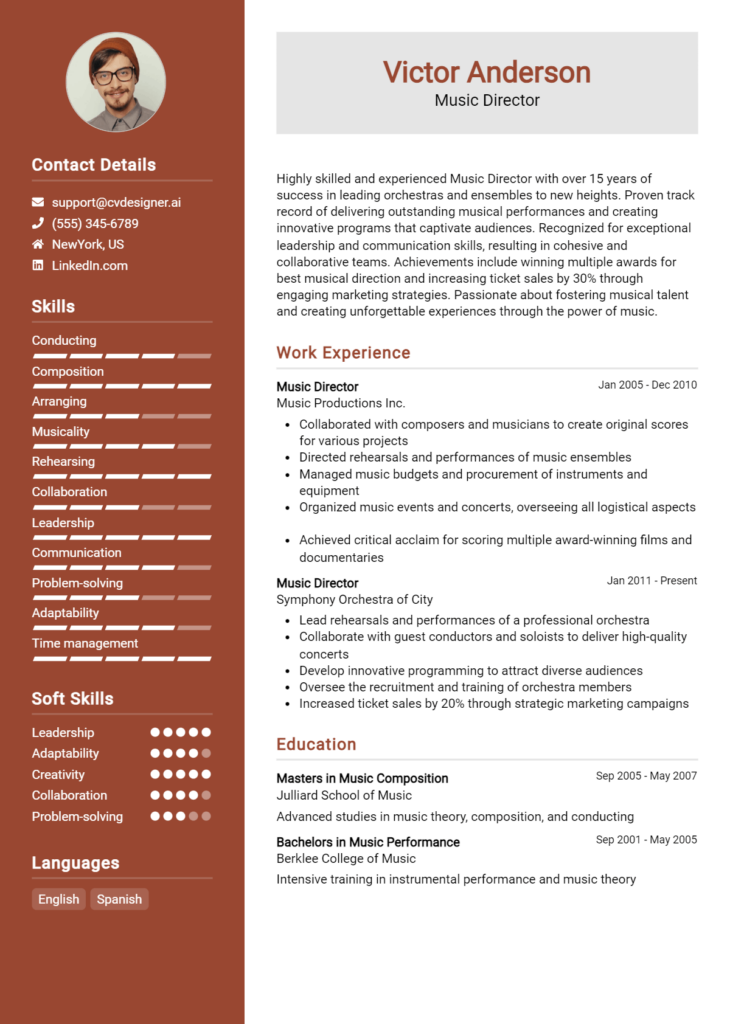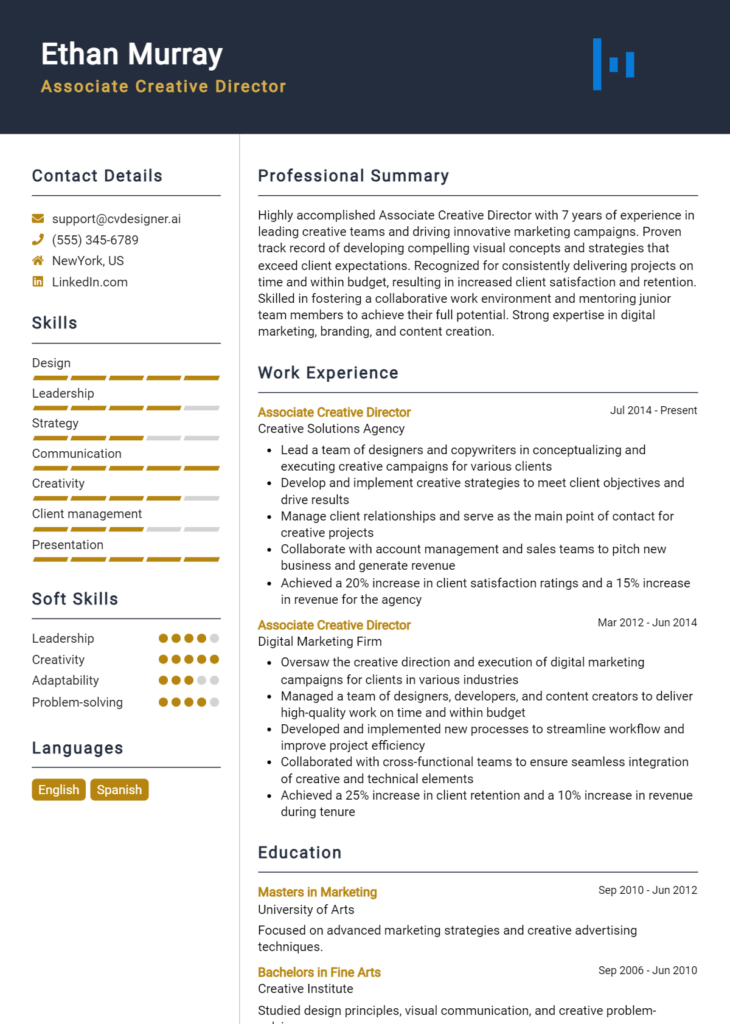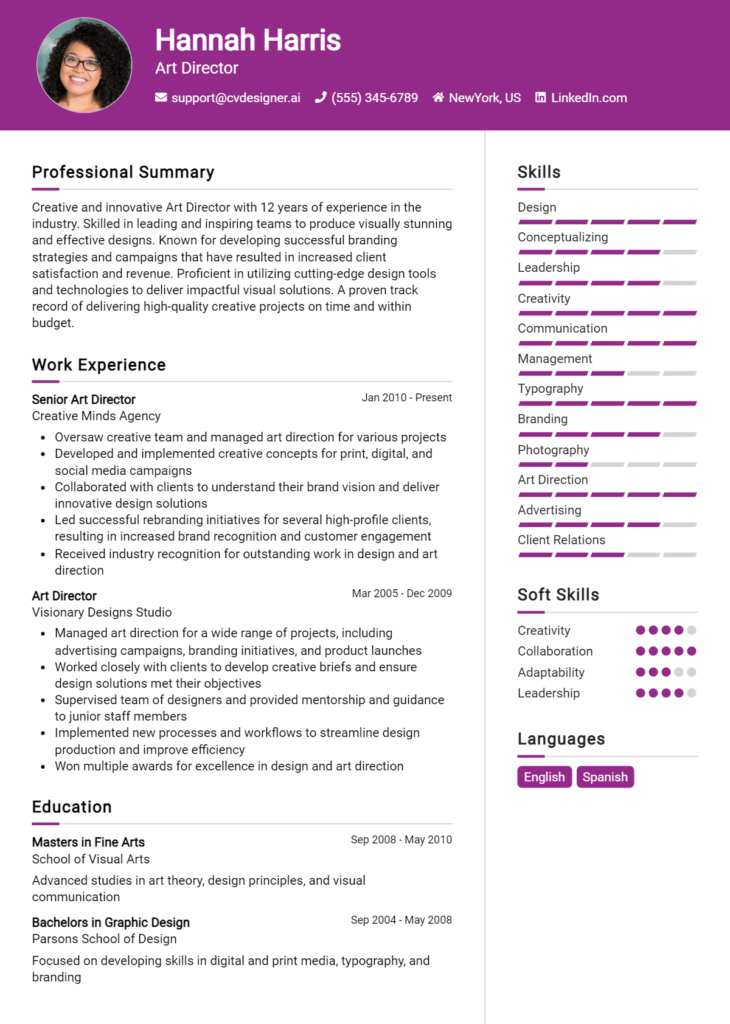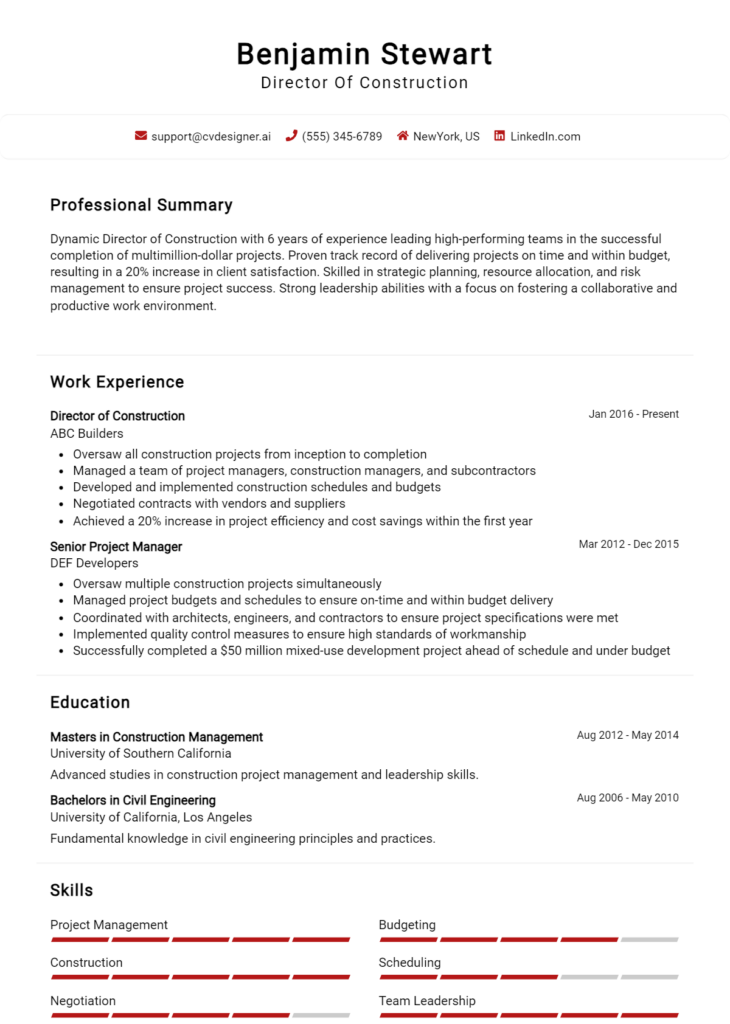Most Popular Director Resume Examples
Explore additional Director resume samples and guides and see what works for your level of experience or role.
As a Director, you hold a pivotal position within any organization, steering the strategic direction and influencing key decisions that shape the company's future. Your expertise and leadership skills not only drive performance but also inspire teams to achieve their highest potential. In a competitive job market, a well-crafted resume becomes your most powerful tool, showcasing your accomplishments and demonstrating your value to prospective employers. A compelling resume not only highlights your qualifications but also tells your unique story, making it essential for standing out among a pool of candidates vying for the same executive role.
In this comprehensive guide to Director resume writing, we'll delve into the specific responsibilities and skills that define successful Directors, helping you articulate your qualifications effectively. You'll discover the best resume formats to employ, ensuring your document is visually appealing and easy to navigate. We will also highlight common mistakes to avoid that could detract from your professional narrative. Additionally, you'll find resume examples tailored for various levels of Directors, providing inspiration and insight into effective presentation. To further enhance your resume, we’ll offer valuable tips on crafting your narrative and selecting the right resume templates that align with your personal brand. Whether you are an aspiring Director or looking to elevate your current resume, this guide will equip you with the knowledge and tools to make a lasting impression.
Key Responsibilities and Skills for a Director
As a Director, individuals are expected to lead and oversee various aspects of an organization, ensuring that strategic goals are met while fostering a productive work environment. Key responsibilities typically include:
- Developing and implementing strategic plans to drive the organization's growth and success.
- Leading and managing teams to ensure alignment with company objectives and effective performance.
- Establishing and maintaining relationships with key stakeholders, including clients, partners, and board members.
- Monitoring industry trends and competitor activities to inform decision-making and strategic direction.
- Overseeing budgeting, financial planning, and resource allocation to optimize operational efficiency.
- Ensuring compliance with legal and regulatory requirements in all business operations.
- Communicating effectively with all levels of the organization and presenting updates to stakeholders.
Essential skills required for a Director position include:
- Leadership and team management
- Strategic thinking and planning
- Financial acumen and budgeting skills
- Excellent communication and interpersonal skills
- Problem-solving and decision-making abilities
- Knowledge of industry trends and market dynamics
- Ability to build and maintain stakeholder relationships
Highlighting these skills effectively in the resume skills section is crucial for standing out in the competitive job market. Tailoring these responsibilities and skills to the specific job description can significantly enhance your candidacy. Consider how these skills are relevant in crafting a strong CV, demonstrating not only your qualifications but also your ability to meet the unique demands of the role you are applying for.
Best Resume Format and Structure for a Director
When crafting a resume for a Director position, it's essential to choose a format that highlights leadership experience, strategic thinking, and industry expertise. Below is a detailed guide on the best resume format and structure for a Director role.
Contact Information
Begin your resume with your contact information at the top. This should include your full name, phone number, email address, and LinkedIn profile (if applicable). Ensure your email address is professional, and consider including your location (city and state).
Professional Summary
This section should be a brief, impactful paragraph summarizing your career achievements, relevant skills, and your vision as a leader. Aim for 3-5 sentences that showcase your years of experience, industry-specific expertise, and key accomplishments. Tailor this summary to align with the specific director role you are applying for.
Work Experience
Your work experience section should be comprehensive and highlight your leadership roles. Use reverse chronological order, starting with your most recent position. For each role, include the following:
- Job Title
- Company Name and Location
- Dates of Employment (Month/Year format)
- Bullet points detailing your responsibilities and achievements, focusing on quantifiable results (e.g., "Increased revenue by 20% in one year").
Be sure to emphasize leadership roles, strategic initiatives that you have led, and any cross-functional collaboration. Aim for 5-7 bullet points for each role, ensuring they are action-oriented and impactful.
Education
List your educational background, starting with your highest degree. Include the following information for each degree:
- Degree Type (e.g., MBA, Master’s in Leadership)
- Major
- University Name and Location
- Graduation Date (Month/Year)
If you have relevant academic honors or certifications, you can include those as well.
Skills
This section should outline relevant skills that support your candidacy for a Director role. Focus on both hard and soft skills, such as:
- Strategic Planning
- Team Leadership
- Financial Acumen
- Change Management
- Communication Skills
- Project Management
Use keywords from the job description to ensure alignment with the role’s requirements.
Certifications
Include any professional certifications relevant to your field or position. This can enhance your credibility and demonstrate your commitment to ongoing professional development. Examples might include:
- Certified Project Management Professional (PMP)
- Six Sigma Certification
- Leadership Certificate from a recognized institution
Tips for Format and Structure
- Consistent Formatting: Make sure your font style and size are consistent throughout the document. Use bold for section headings and job titles to improve readability.
- White Space: Use white space effectively to create a clean layout. This helps avoid overwhelming the reader and highlights key sections.
- Length: Aim for a two-page resume if you have extensive experience. For less experienced candidates, one page may suffice.
- Tailoring: Customize your resume for each application to reflect the specific requirements of the Director role, using industry-specific terminology.
The chosen format should complement a corresponding cover letter format. Your cover letter can expand on specific experiences mentioned in your resume, providing deeper insights into your leadership style and strategic approach. Ensure that both documents maintain a consistent style in terms of fonts, colors, and overall branding, which can reinforce a strong personal brand.
By following this guide, you can create a compelling resume that effectively showcases your qualifications for a Director position, making a strong impression on potential employers.
Writing Tips and Best Practices for a Director Resume
When crafting a resume for a Director position, it's essential to present a clear narrative of your leadership experience and organizational impact. Highlight your strategic vision and ability to drive results by showcasing key achievements in previous roles. Use bullet points to enhance readability and ensure that your resume is concise and focused. Remember to tailor your content to reflect the specific requirements of the job you are applying for, which may involve using resume writing tips to achieve a polished and professional look. Additionally, consider how these practices can be applied to your cover letter to create a cohesive application.
- Use strong action verbs to start each bullet point, such as "led," "developed," "implemented," or "oversaw," to convey your leadership capabilities effectively.
- Quantify your achievements wherever possible, including metrics like "increased revenue by 25%" or "reduced costs by $500,000," to demonstrate your impact on the organization.
- Incorporate industry-specific keywords to align your resume with the job description, making it more likely to pass through applicant tracking systems (ATS).
- Keep your resume to a maximum of two pages, ensuring that every word counts and that you include only relevant information.
- Use a professional format with consistent font styles and sizes, clear headings, and ample white space to enhance readability.
- Highlight your soft skills, such as communication, teamwork, and conflict resolution, alongside your technical skills to provide a well-rounded picture of your capabilities.
- Tailor your summary statement to reflect your unique selling points and align them with the company’s values and goals.
- Finally, don't forget to proofread your resume for any grammatical or typographical errors, as attention to detail is crucial in a Director role.
Common Mistakes to Avoid in a Director Resume
When crafting a resume for a Director position, it's crucial to present your experience and skills in a way that captures the attention of hiring managers and showcases your leadership capabilities. However, many candidates make common mistakes that can undermine their chances of landing an interview. To stand out in a competitive job market, it's important to avoid these pitfalls and ensure your resume is polished, concise, and tailored to the role. Here are some common mistakes to avoid in your Director resume:
- Overloading the resume with excessive information, leading to clutter and confusion.
- Using generic descriptions that fail to highlight specific achievements and leadership qualities.
- Failing to quantify accomplishments with metrics or results, making it difficult to gauge impact.
- Neglecting to tailor the resume to the job description, missing the opportunity to align with the company's needs.
- Including irrelevant work experience, diluting the focus on pertinent skills and achievements.
- Using overly complex language or jargon that may not resonate with all readers.
- Ignoring formatting consistency, which can make the resume look unprofessional.
- Omitting a strong summary statement that encapsulates your career objectives and key qualifications.
- Failing to proofread for spelling and grammatical errors, which can create a negative impression.
- Not including keywords from the job posting that are essential for passing applicant tracking systems.
For a comprehensive overview of common mistakes to avoid in a resume, consider reviewing the common mistakes to avoid in a resume. Additionally, while you're refining your resume, don't overlook the importance of a well-crafted cover letter; be sure to check out the common cover letter mistakes that should also be avoided.
Sample Director Resumes
When applying for a Director position, it’s essential to showcase your leadership skills, strategic thinking, and relevant experience. Below are three sample resumes tailored for different levels of expertise: one for an experienced professional, one for an entry-level candidate, and one for a career changer. These examples highlight various skills and experiences that can help you stand out in a competitive job market. For more inspiration, consider exploring additional resume examples and corresponding cover letter examples to create a comprehensive job application package.
Sample Resume 1: Experienced Professional
John Doe
[City, State]
[johndoe@email.com]
[Phone Number]
Professional Summary
Dynamic and results-oriented Director with over 10 years of experience in leading cross-functional teams and driving organizational success through innovative strategies. Proven track record in achieving business objectives and enhancing operational efficiency. Strong communicator and relationship builder with expertise in stakeholder engagement.
Professional Experience
Director of Operations
ABC Corporation, City, State
January 2018 – Present
- Spearheaded operational strategy, resulting in a 25% increase in efficiency and a 15% reduction in costs over three years.
- Led a team of 50 employees, fostering a culture of collaboration and continuous improvement.
- Developed and implemented performance metrics, enhancing accountability and team performance.
Senior Manager
XYZ Inc., City, State
June 2013 – December 2017
- Managed multiple projects with budgets exceeding $1M, ensuring timely completion and adherence to quality standards.
- Collaborated with executive leadership to define strategic direction and implement new business initiatives.
- Mentored junior managers, contributing to professional development and succession planning.
Education
Master of Business Administration (MBA)
University of Business, City, State
Graduated: May 2013
Skills
- Strategic Planning
- Team Leadership
- Budget Management
- Project Management
- Stakeholder Engagement
Sample Resume 2: Entry-Level Candidate
Jane Smith
[City, State]
[janesmith@email.com]
[Phone Number]
Professional Summary
Ambitious and motivated recent graduate with a Bachelor’s degree in Business Administration. Eager to leverage strong analytical skills and leadership capabilities in a Director role. Committed to driving team success and organizational growth through effective communication and innovative problem-solving.
Education
Bachelor of Business Administration
University of State, City, State
Graduated: May 2023
Internship Experience
Operations Intern
DEF Company, City, State
June 2022 – August 2022
- Assisted in the development of operational strategies, contributing to a project that improved process efficiency by 10%.
- Collaborated with team members on market research and data analysis to support business decisions.
- Provided administrative support, ensuring smooth daily operations and communication among departments.
Leadership Experience
President, Business Club
University of State, City, State
August 2021 – May 2023
- Led a team of 15 members, organizing workshops and networking events that increased student engagement by 30%.
- Developed partnerships with local businesses to provide mentorship opportunities for club members.
Skills
- Communication
- Data Analysis
- Team Collaboration
- Project Coordination
- Problem-Solving
Sample Resume 3: Career Changer
Mark Johnson
[City, State]
[markjohnson@email.com]
[Phone Number]
Professional Summary
Versatile professional with 8 years of experience in project management and team leadership within the technology sector, seeking to transition into a Director role. Proven ability to drive project success and foster team collaboration. Adept at strategic planning and operational oversight.
Professional Experience
Project Manager
Tech Solutions Inc., City, State
March 2018 – Present
- Directed cross-functional teams in the execution of technology projects, consistently meeting deadlines and budget constraints.
- Implemented agile methodologies, improving project delivery times by 20%.
- Engaged with clients to understand their needs and align project goals with business objectives.
Team Lead
Software Innovations, City, State
January 2015 – February 2018
- Supervised a team of developers, ensuring high-quality deliverables and efficient workflow.
- Conducted training sessions to enhance team skills and knowledge, resulting in a 15% increase in productivity.
- Collaborated with senior management to align team objectives with organizational goals.
Education
Bachelor of Science in Computer Science
Technical University, City, State
Graduated: May 2014
Skills
- Project Management
- Leadership
- Strategic Planning
- Agile Methodologies
- Client Relations
These resumes serve as examples to help you craft your own. Remember, tailoring your resume to match the specific requirements of the Director role you’re applying for is crucial for success.
Checklist for a Director Resume
- Proofread for Typos and Errors: Carefully read through your resume to catch any spelling, grammar, or punctuation mistakes. Consider using tools like Grammarly for an extra layer of proofreading.
- Check Formatting Consistency: Ensure that your font style, size, and spacing are uniform throughout the document. Consistent formatting enhances readability and professionalism.
- Tailor to the Job Description: Customize your resume to align with the specific job you are applying for. Highlight relevant skills and experiences that match the requirements outlined in the job posting.
- Quantify Achievements: Use numbers and metrics to quantify your accomplishments. This demonstrates your impact and makes your achievements more tangible to potential employers.
- Prioritize Relevant Experience: Place the most relevant work experience at the top of your employment history. Focus on roles that showcase your leadership skills and strategic contributions.
- Use Action Verbs: Start each bullet point in your experience section with strong action verbs. This creates a dynamic and engaging narrative about your contributions and achievements.
- Include a Professional Summary: Add a brief professional summary at the top of your resume that encapsulates your experience, skills, and career goals. This provides a snapshot of what you bring to the table.
- Keep it Concise: Aim for a resume length of one to two pages. Be succinct and only include information that is pertinent to the Director role you are targeting.
- Seek Feedback: Have a trusted colleague or mentor review your resume. Fresh eyes can catch errors you might have missed and provide valuable insights.
- Consider Using an AI Resume Builder: To ensure all elements are well-organized and visually appealing, consider using an AI resume builder. This can streamline the formatting process and help you focus on content.
Remember, a similar checklist can also be followed for creating a CV to ensure it meets the necessary standards for academic and professional positions.
Key Takeaways for a Director Resume Guide
Crafting a compelling resume for a Director role is essential to showcase your leadership abilities and strategic vision. Remember to incorporate the examples and tips provided in this guide to highlight your achievements and align your experience with the expectations of potential employers. Tailor your resume to reflect not just your skills but also your impact on previous organizations. As you prepare to take the next step in your career, consider downloading a professionally designed template from resume templates or a complementary cover letter template to enhance your application package. Additionally, our user-friendly resume maker can help you create a polished and visually appealing resume that stands out in a competitive job market. Take action today and set yourself on the path to landing that coveted Director position!
